Although we praise a bachelor’s degree, we rarely discuss the benefits of pursuing an associate degree. According to Census Bureau statistics, in 2021, 10.5% of Americans completed an associate degree, compared to 23.5% who finished a bachelor’s. Despite these numbers, getting an associate has become more popular over the last few years.
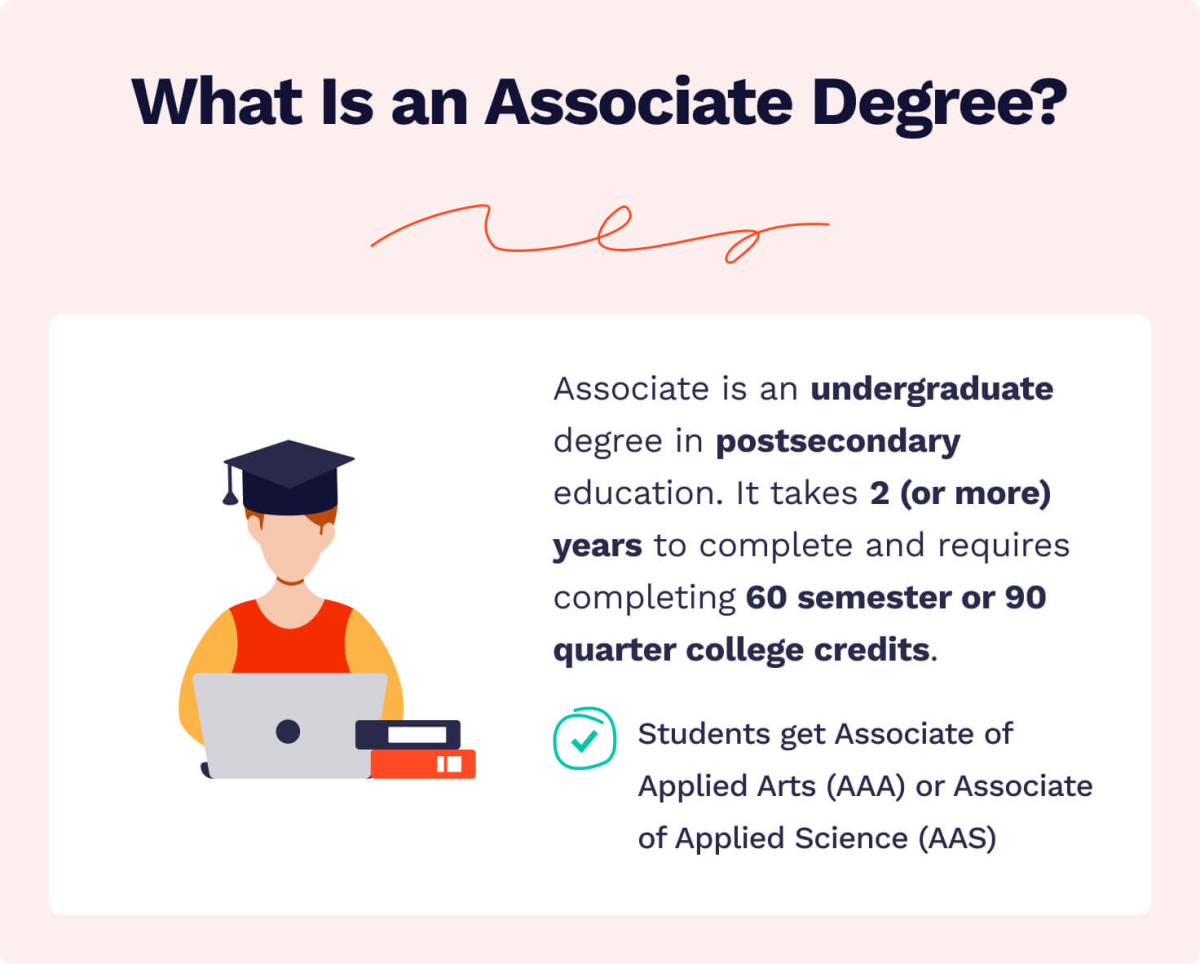
An associate degree is often underestimated and should be considered a prospective career route. Not only because it is cheaper and quicker but also because, in the modern world, we need to rethink the traditional education system and help everyone have equal access to the labor market and fair salaries. In this article, our experts will cover everything you need to know about associate degrees, including different types of programs, possible risks, and benefits.
🎓 What Is an Associate Degree?
An associate degree is an undergraduate program that’s one step above a high school diploma and one step below a bachelor’s degree. Usually, it lasts for two years and costs less than half of a bachelor’s. When someone pursues an associate degree, they typically want to obtain a specialized job after graduation or transfer the credits to a four-year college degree.
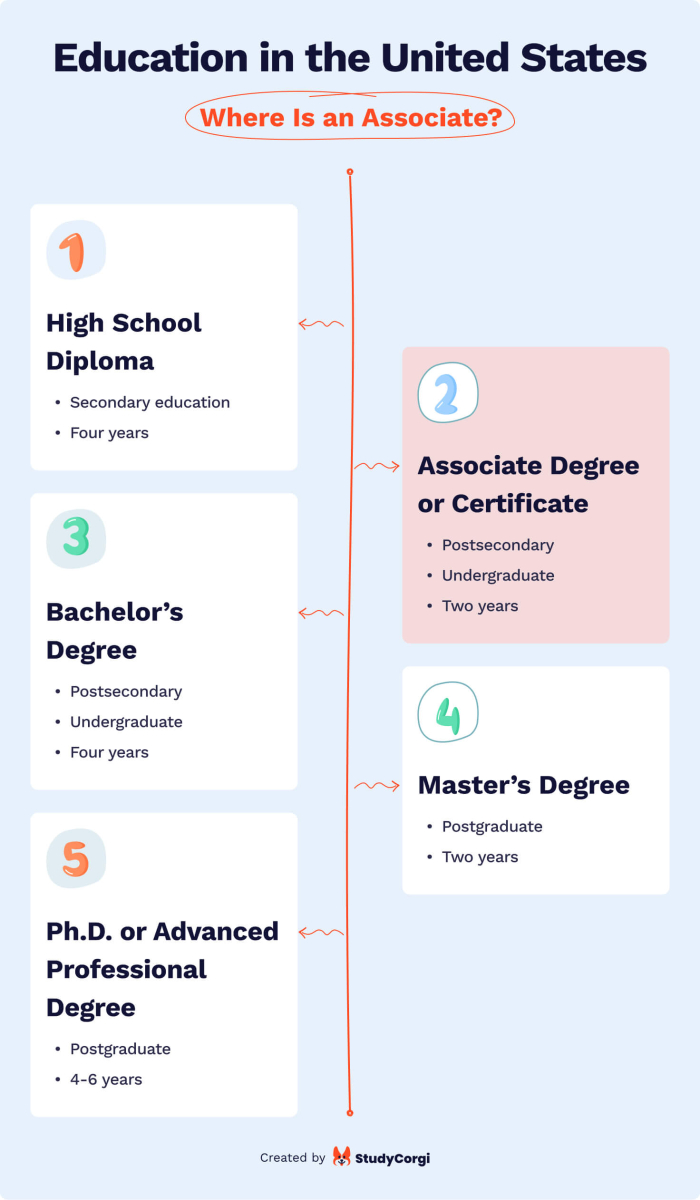
What Jobs Can You Get with an Associate Degree?
An associate degree can help you land an entry-level position in many fields. Here’s a list of the job areas available for graduates.
💻 IT:
- Web developer
- Computer-network-support specialists
💉 Medicine:
- Ultrasound technician
- Physical therapy assistant
- Magnetic resonance imaging technologists
- Dental hygienist
- Veterinary technician
- Registered nurse
⚖️ Law:
- Paralegal
- Court reporter
- Law enforcement officer
- Legal process server
🪪 Management:
- Human resources assistant
- Medical assistant
- Executive administrative assistant
- Food service manager
- Office manager
👔 Other jobs:
- Chef
- HVAC technician
- Preschool teacher
- Air traffic controllers
- Library technician
- Fitness instructor
How to Get an Associate Degree?
Associate degrees offer an accessible entry point into a career or higher education. This is why the requirements for admission are minimal. The most essential criterion is a high school diploma or a GED. Note that SAT scores aren’t required. Sometimes, you might need to provide a minimum GPA of around 2.00.
One can become an Assoc in a community college, technical college, vocational school, Bible college, or university, and admission requirements vary for each institution. Occasionally, admission officers may ask you to provide letters of recommendation or a portfolio.
How Long Does It Take to Get an Associate Degree?
An associate degree is often called a 2-year college degree because it takes two years to complete. However, associate programs usually provide online classes and shorter, more frequent semesters so that you can graduate faster. Alternatively, many schools offer an individualized schedule to those with personal obligations or who need to combine work with studies.
How Many Credits Is an Associate Degree?
To complete an associate degree, you need to earn 60 credits. Usually, 60 credits are split up into 15 credits per semester. Since most courses are three credits, you must take around 20 classes to get an associate degree. These classes include general courses, major-specific courses, online courses, and electives.
What Comes After an Associate Degree?
Some students work toward an associate degree with the long-term goal of earning a bachelor’s degree. However, associate degrees also provide outstanding training in specific disciplines and can lead to a successful career. These are two options for Assocs, and the decision is yours.
🆚 Associate Degree Vs. Bachelor Degree
Here are essential differences if you’re unsure whether an associate’s or bachelor’s degree will best match you.
🧑🎓 Associate Degree Types with Examples
There are four main types of associate degrees:
- Associate of Arts (AA). AA degrees focus on the humanities and liberal arts. This option is more general in its studies and allows graduates to pursue a bachelor’s degree or start a career.
- Associate of Applied Arts (AAA). AAA degrees also center around the humanities and liberal arts. However, they include more hands-on learning experience and teach practical skills. These degrees are popular among students who want to start a career right after graduation.
- Associate of Science (AS). AS degrees provide theory on technology, math, and science. Similar to AA degrees, graduates can either enter the workforce or pursue a bachelor’s degree.
- Associate of Applied Science (AAS). AAS degrees teach technology, math, and science, including hands-on learning experiences. This allows students to learn applicable skills necessary to obtain a well-paying job.
Let’s consider some possible associate degrees you might be interested in.
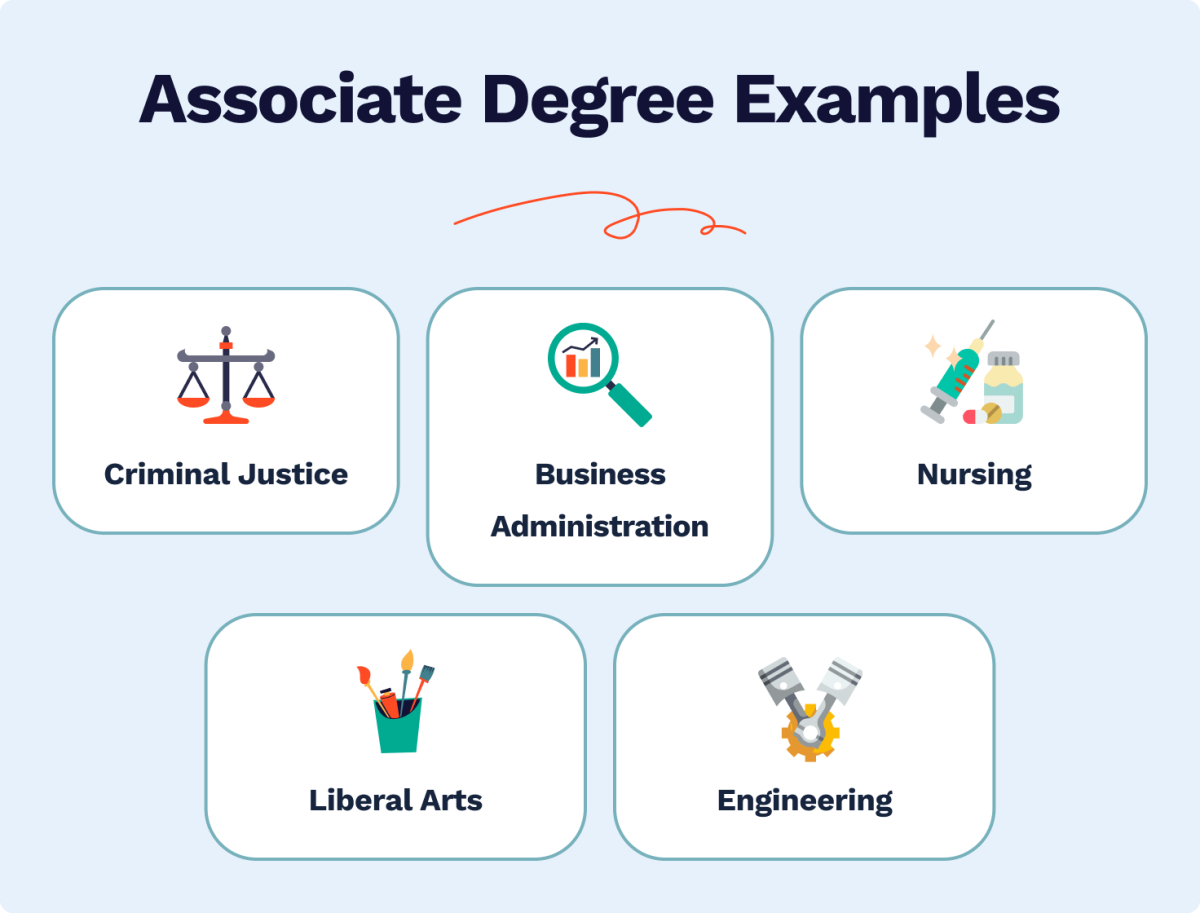
Business Administration Associate Degree
A Business Administration Associate Degree, also known as an Associate of Business Administration (ABA) or Associate of Arts in Business Administration (AABA), is a great solution for those who want to pursue a business career.
While getting your Assoc in business administration, you’ll learn the main principles of the business world. The list of courses includes economics, project management, business ethics, and international business, plus the electives you can choose that will best match your goals.
Associate Degree in Criminal Justice
An Associate Degree in Criminal Justice has two paths: an AA in Criminal Justice and an AS in Criminal Justice. This associate degree is the perfect option for those who consider protecting society their mission.
Pursuing a Criminal Justice program will provide the skills and knowledge to start a career in the courts, public safety, adult and juvenile corrections, law enforcement, private investigation, and more. You’ll get a chance to interact with experts in the criminal justice field and acquire a comprehensive overview of the criminal justice system.
Nursing Associate Degree
Examples of Associate Degrees in Nursing include Associate in Applied Science in Nursing and Associate in Science in Nursing. The choice of a program depends on whether you want to continue your nursing education and get a bachelor’s degree or take the first step toward a nursing career.
An Associate Degree in Nursing allows students to gain fundamental knowledge and practical skills in microbiology, foundations in nursing, chemistry, behavioral health, and more. This degree can open you up to a wide range of nursing careers, such as registered nurses, personal care nurses, and rehabilitation nurses.
Liberal Arts Associate Degree
An Associate Degree in Liberal Arts helps build a solid foundation for a bachelor’s degree. There are two liberal arts degree options for students: Associate of Arts, Liberal Arts (AA degree) and Associate of Science, Liberal Arts (AS degree).
The Associate of Arts degree offers a great choice of majors in subjects outside of science, technology, and mathematics. These degrees also are more flexible about choosing elective courses. The variety of areas you can explore within your Associate Degree in Liberal Arts includes art history, psychology, history, journalism, and much more.
Associate Degree in Engineering
An Associate Degree in Engineering is available at many schools. It can be called an Associate of Science in Engineering (ASE) or an Associate of Applied Science with a focus on engineering (AAS).
An Assoc in Engineering Technology degree delivers core knowledge and hands-on learning experience in measuring and implementing digital systems and devices. Students receive the opportunity to learn the fundamentals they need to pursue a bachelor’s degree and develop a versatile skill set to get a well-paid job after graduation. The available majors include machine learning and design techniques, medical technology and healthcare systems, as well as renewable energy and sustainable power.
🤑 The Highest Paying Associate Degree Jobs in 2023
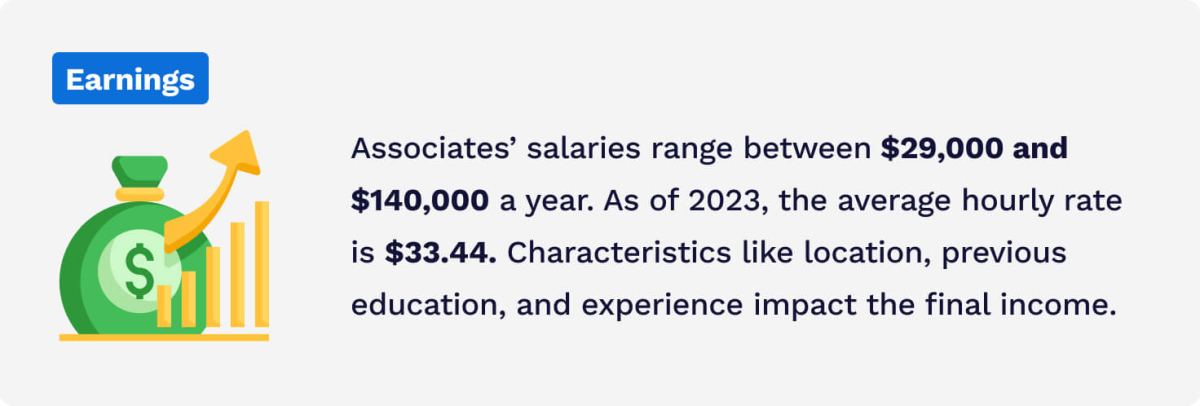
Did you know that with an associate degree, you can receive an annual salary of more than $50,000? Here is a list of the top highest-paying jobs you can get after graduating from a two-year college.
🏫 Where to Get an Associate Degree
Associate degree programs allow students to gain fundamental knowledge and useful skills on campus or online. Consider the pros and cons of these two formats to understand which one will be the right choice for you.
On Campus
The main advantage of pursuing an associate degree on campus is that you can dive deeper into the learning process and experience fewer distractions. Moreover, you receive individual attention from professors and can address and solve any issue quickly. However, time management might become an issue for students who combine working and studying on campus. Here are three excellent Assoc degree programs you can apply to if you want to study on campus.
- Associate Degree Nursing Program at The University of South Carolina Lancaster.
The Associate Degree Nursing Program prepares students for registered nursing practice to provide direct client care. - The Agriculture Production Systems Associate Degree at Nebraska College of Technical Agriculture.
The Agriculture Production Systems degree allows students to learn real-world skills with farm equipment on a 550-acre campus farm. - The Information Technology Associate Degree at North Central Kansas Technical College.
The Information Technology program provides training in web page design, network administration, diagnosing, and troubleshooting computer problems and software applications.
Online
The most significant risk of online degrees is that some schools don’t have accreditation. Without verification from an external authority that the online programs meet the educational quality standard, you might not get a job after graduation.
For some students, an online associate degree might be the best option because it’s flexible and budget-friendly. Even if you don’t have a chance to attend an online lecture, you can watch a recording anytime. If you plan on taking an online associate degree, consider these three trustworthy programs:
- Criminal Justice Associate Degree at Southern New Hampshire University.
An online Criminal Justice degree expands the boundaries of a traditional criminal justice program and exposes students to current criminology theories and emerging national and global trends. - Online Associate Degree in Psychology at Liberty University.
Liberty’s online degree in psychology starts with foundational general education classes and then moves to psychology courses focusing on all phases of human development. - Online Early Childhood Education Associate Degree program at Ivy Tech.
Students of the online Early Childhood Education program explore early childhood development in physical, social, emotional, and cognitive areas.
🧑🏫 Associate Degree Transfer to Bachelor
Even after completing an associate degree, many graduates still feel like they lack the education requirements for their desired path. Luckily, they can continue their academic journey and chase another academic degree at this stage.
Some reasons to get a bachelor’s degree after an Assoc are the following:
- You want to change your career choice.
- You are looking for a promotion and a higher salary.
- You want to boost your soft skills.
- You wish to expand your professional network.
Below you will discover a list of essential steps to take to continue your educational journey with a bachelor’s degree.
Step 1: Determine Your Kind of Associate Degree
Not all associate degrees are designed to transfer easily to a four-year college. If you know what major you want to study for your bachelor’s degree, you must tailor your course to its requirements. For example, if you’re getting an associate degree in Psychology but want to pursue a bachelor’s degree in IT, you need to take additional courses related to coding, cybersecurity, etc.
Step 2: Research Your University’s Articulation Agreements
The next step is to consider if your school has an articulation agreement. This document describes a transfer plan between an associate-level program and a bachelor’s degree. An articulation agreement document helps ensure that all your completed classes (credits) can be transferred.
Some universities, like Northeastern University, have articulation agreements with other colleges, making the choice of a perfect program and transferring your credits easier. Hence, getting acquainted with your school’s transfer plan is crucial.
Step 3: Find out Which of Your Credits Will Transfer
Unfortunately, it’s not always possible to predict if a university will accept your school’s transfer credits. To increase your chances of getting a bachelor’s degree, you should find a four-year program with an academic curriculum similar to yours. Check the university’s website, program description, course materials, and syllabus. You might also want to contact the admissions office for more insights into transferring credits.
Step 4: Test Out College Courses Where Possible
If you’ve had some working experience after completing your associate degree, it can be possible to skip certain course requirements while earning your bachelor’s degree. Some programs, for example, offer prior learning assessments, which is a test demonstrating your expertise in a subject. You might also provide a portfolio that proves your knowledge and skills. Having proved that you’ve already mastered skills in a particular class, you won’t have to relearn the same material again.
Step 5: Enlist the Support of Your Academic Advisor
Schedule regular meetings with your advisor when you get accepted into a bachelor’s program. Your advisor can help define the most straightforward pathway to your successful graduation and ensure your credits transfer how they should. Remember that your advisor is there to help you reach both your professional and academic goals.
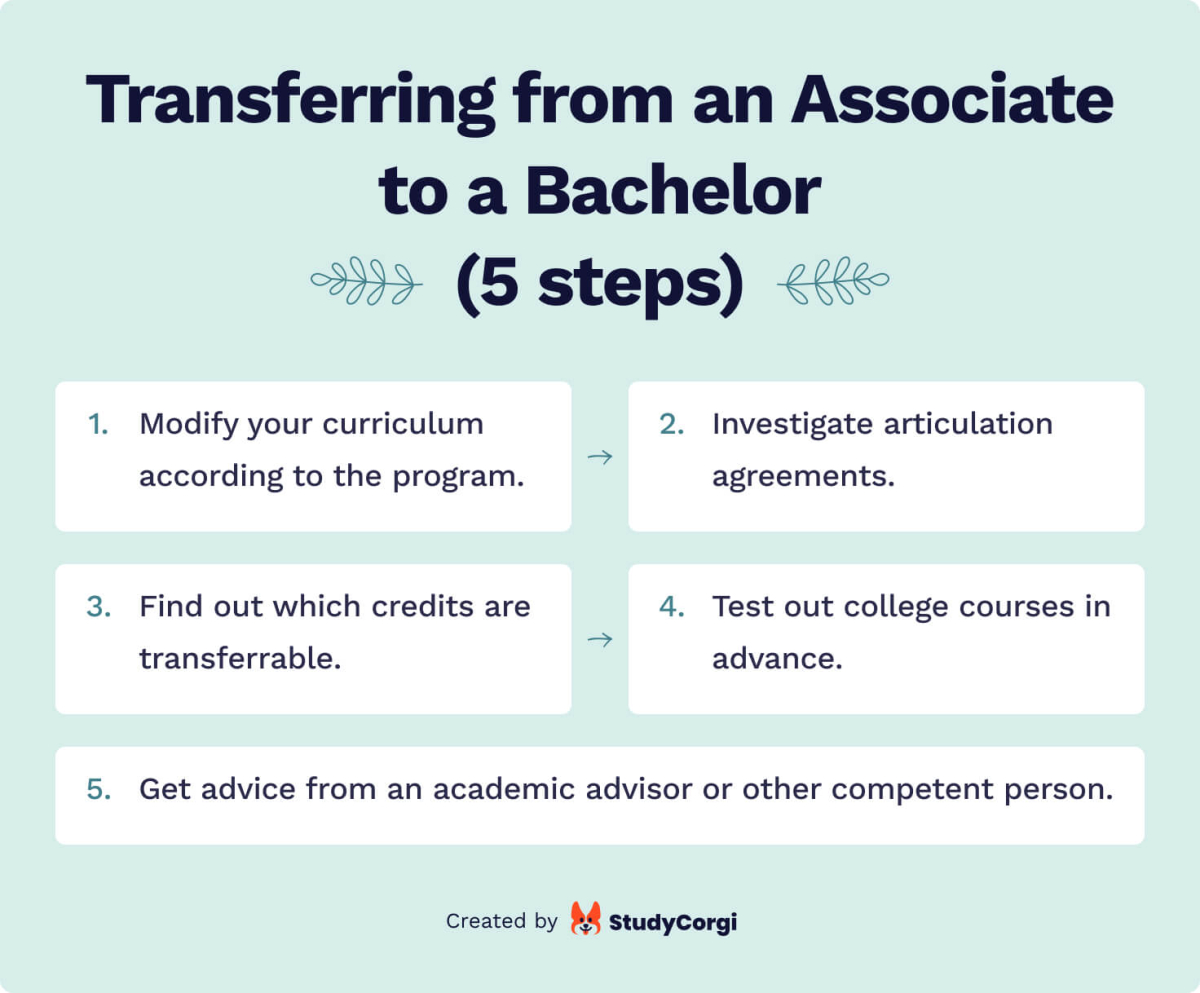
🧐 Should You Get an Associate Degree? Checklist
If you still doubt whether an Assoc is the right choice for you, go through the aspects below. You should consider getting an associate degree if:
- You want to start a career that requires an associate degree;
- You want to receive an affordable education;
- You want to combine work and studies;
- You aren’t sure about your career yet and want to study some general courses;
- You want to get a hands-on learning experience and gain practical skills;
- You don’t have grades or GPA scores high enough to pursue a bachelor’s degree.
🎭 Is Getting an Associate’s Degree Worth It?
Various factors can help you decide what degree to pursue, whether an associate’s or bachelor’s degree. Below you will find the pros and cons of pursuing an Assoc.
Benefits of an Associate Degree
The main benefits of an associate degree include the following:
- Less strict admission requirements. Even students with low GPAs can begin their higher education at a two-year college.
- Lower tuition. Community and public colleges have low tuition rates, especially for young people living in a district where the school is located.
- Career opportunities. An Assoc degree gives more job opportunities to a person than a high school diploma.
- Less time to graduate. Usually, associate degrees take two years to complete, allowing graduates to obtain jobs quickly.
- Flexible format. Associate degree programs offer students the flexibility of attending part-time or full-time and choosing courses in the evenings and online.
Disadvantages of an Associate Degree
Some important risks of getting an associate degree are the following:
- High competition with bachelor’s graduates. Sometimes, employers may give a job to someone with a bachelor’s degree.
- Difficulties with transferring to a bachelor’s degree. Some types of associate programs, such as an Applied Associate Degree of Science (AAS), can make it difficult to transfer credits.
- Lower earnings. Even though getting an Assoc allows you to start a job sooner, you might have a lower salary than bachelor’s graduates.
- Low commitment levels. Since many students combine getting an associate degree with working, you might end up in classes filled with students with no motivation.
- Limited program options. If you’re interested in a particular subject, such as Anthropology, you might find it hard to find a suitable Assoc.
💬 Associate Degree: Tips from Graduates
To summarize our article, we offer you to reflect upon first-person points of view. Read the real stories we collected from Assoc and Bachelors from different programs. They share their experiences and the most valuable tips to help you make the proper choice.
An associate degree is a great opportunity to spend your time when you want to get a bachelor’s degree but don’t know which major to choose. Associate degrees are more flexible and allow you to try yourself out in different areas.
Getting an Assoc is helpful if you want to become an expert in a field or get a managerial position to escape manual labor.
Not all associate degrees are created equally. If you want to start a career, choosing an applied degree is better. However, if you want to transfer to a bachelor’s, consider a program with more general courses to transfer your credits more easily.
A two-year college is a good place for those who need more time to decide on their education and career. You can apply for an Associate Degree in Liberal Arts and explore different subjects.
An associate degree is helpful for people who completed a GED instead of getting a high school diploma. The admission requirements are less strict than for a bachelor’s degree.
You can find full stories on these Reddit threads:
